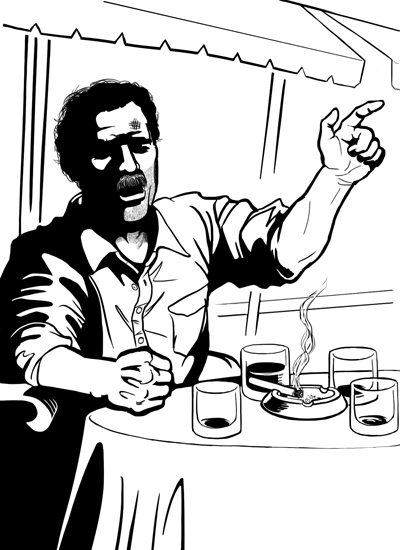See Page XX, Trail of Cthulhu
The real Jose Robles
 by Adam Gauntlett
by Adam Gauntlett
Dos comes in. Has found out Robles executed. Wants to investigate. Discuss with Hem the danger of D investigating. R had fair trial – gave away military secrets. Josephine Herbst, a novelist and columnist covering the Spanish Civil War, wrote that entry in her diary after a post-artillery bombardment drinking session in Hemingway’s room at the Hotel Florida. It was the first indication of what was to become a serious rift in the friendship between Hemingway and Dos Passos, over the fate of Jose Robles, a mutual friend who had been taken by the authorities. Hemingway believed the action, and execution, had been justified; Dos Passos was appalled that a secret trial – if trial there had been – could result in summary execution. Was this Madrid, or Chicago under Capone?
That event is the inspiration for Soldiers of Pen and Ink. Imagine a world in which anyone could be snatched off the street and just vanish, as if they had never been. Imagine what your friends would say. Would they be like Hemingway, unquestionably accepting your guilt without demanding evidence? Would they be like Dos Passos, an anguished man trying to find out what happened to his friend? Would they do as Robles’ own son did, and publicly accept his father’s guilt for the sake of the Republican cause?
Even now nobody really knows what happened to Robles. None of the people who were there at the time agree; was Robles a Fascist spy, caught with sensitive documents in his possession? Was he falsely accused? Was his knowledge of Soviet backstage shenanigans inconvenient to the Stalinists? Was there even a trial? Was he shot by firing squad, assassinated by the NKVD, or did something else happen to him?
That kind of world seems, in retrospect, to be almost a fever dream. I’m irresistibly reminded of Through the Looking Glass, in which the Mad Hatter is accused and sentenced, not of a crime he did commit, but for one he might commit at some future date. Or perhaps he won’t commit it at all, but since when did Wonderland care about these piffling details?
Fever dreams lead, of course, to Carcosa, in the Lovecraftian mythos. I’m particularly fond of John Tynes’ take on the concept: It breaks things down not from without, but within. As perfect a description of the Fifth Column as you could wish for, and what is Carcosa in this context if not the ultimate Fifth Column, with the ultimate goal of making all things like itself, in the end?
Or put it another way:
The Tattered King may be symbolic of the beginning of the end, its shredded form a warning that the viewer is reaching lethal mneme toxicity. That would suggest the Tattered King is not actually part of the Hastur mneme at all, but a projection of the viewer’s own mental state. That would make it a kind of forerunner of destruction, the Pallid Mask the viewer’s own face, so distorted due to the influence of the mneme that the viewer can no longer recognize it.
I trust you’ll enjoy your time in Madrid. You may never want to leave …


